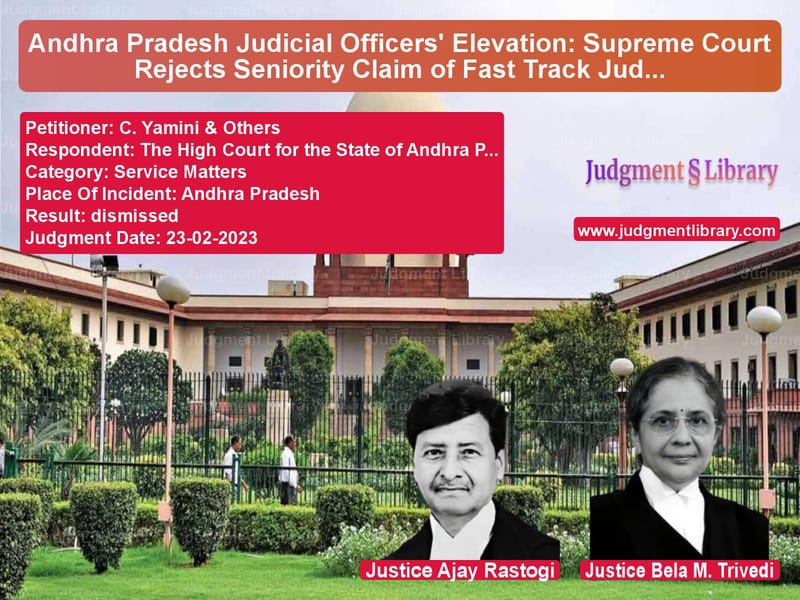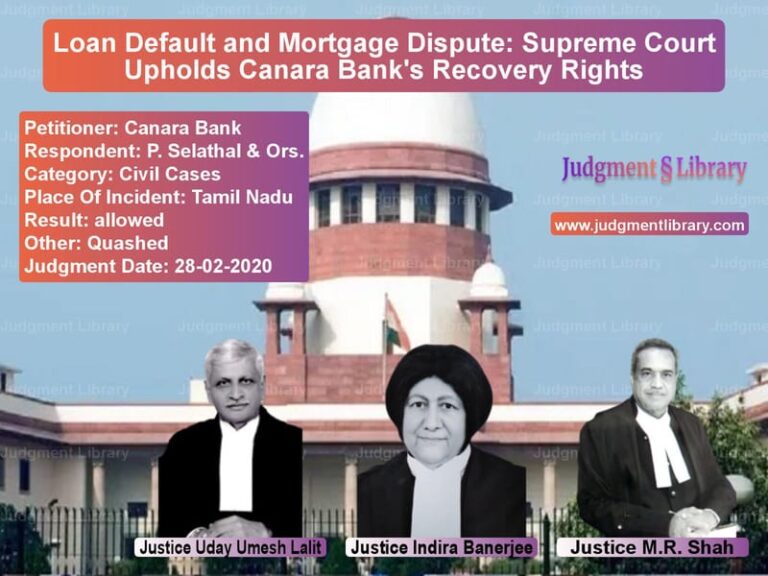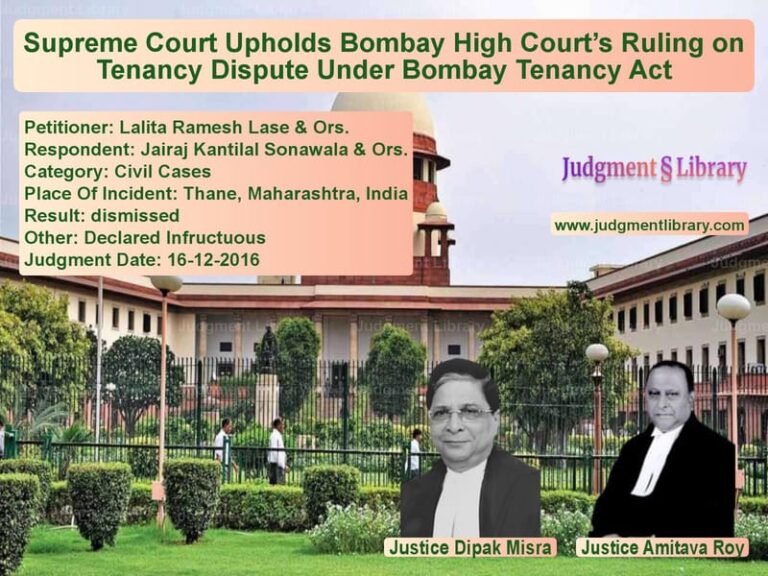Andhra Pradesh Judicial Officers’ Elevation: Supreme Court Rejects Seniority Claim of Fast Track Judges
The Supreme Court of India recently ruled on a writ petition filed by judicial officers from Andhra Pradesh, challenging their exclusion from consideration for elevation to the High Court. The case revolved around whether the petitioners’ prior service as Fast Track Court Judges should be counted as judicial service under Article 217(2)(a) of the Constitution of India. The Court dismissed the petition, reaffirming that their service could only be counted for pensionary benefits and not for seniority.
Background of the Case
The petitioners, members of the Andhra Pradesh State Judicial Service, were initially appointed as District and Sessions Judges on an ad-hoc basis under the Andhra Pradesh State Higher Judicial Service Special Rules for Adhoc Appointments, 2001. Later, they were appointed to the regular cadre of District and Sessions Judges under the Andhra Pradesh State Judicial Service Rules, 2007, following a formal selection process.
Despite continuous service without any break, the petitioners found that officers junior to them in the District and Sessions Judge cadre had been elevated to the Andhra Pradesh High Court. This prompted them to file a writ petition under Article 32 of the Constitution, seeking recognition of their Fast Track Court service for elevation purposes.
Petitioners’ Arguments
The petitioners, represented by senior counsel, contended:
- They had been serving as judicial officers since their initial appointment in 2003, without any break in service.
- Their exclusion from the list of eligible candidates for High Court elevation was unfair, as their names were omitted despite being senior in the District and Sessions Judge cadre.
- They met the ten-year judicial service requirement under Article 217(2)(a) of the Constitution, given their prior service in Fast Track Courts.
- Their Fast Track Court service should be considered part of their regular judicial tenure, as they performed identical functions to regular District Judges.
Respondents’ Arguments
The High Court of Andhra Pradesh, represented by government counsel, argued:
- The petitioners were initially appointed on an ad-hoc basis under the 2001 Rules and later regularized in 2013 under the 2007 Rules.
- Their Fast Track Court service had been recognized for pensionary and retiral benefits, but not for seniority or elevation to the High Court.
- The Supreme Court had already ruled in previous cases that Fast Track Court service does not count toward seniority in the regular judicial cadre.
- The decision not to include their names in the eligibility list was based on the fact that they had not completed ten years of regular judicial service as required under Article 217(2)(a).
Supreme Court’s Judgment
The Supreme Court, after examining the case, reaffirmed its previous stance on Fast Track Court appointments. The Court held:
- The petitioners’ service as Fast Track Court Judges could not be considered as regular judicial service for elevation to the High Court.
- In Kum C. Yamini vs. The State of Andhra Pradesh & Anr., a three-judge bench had already ruled that such service could only be counted for pensionary and retiral benefits.
- The petitioners were appointed on an ad-hoc basis and only regularized later; thus, they did not meet the eligibility requirement of ten years of regular judicial service.
- Seniority is determined by factors such as the nature of appointment and applicable rules. Since Fast Track Court appointments were not made to regular posts, they could not claim seniority.
The Court emphasized:
“The claim of seniority will depend upon several factors, nature of appointment, rules as per which the appointments are made, and whether such appointments were to the cadre posts or not. When the appellants were not appointed to any regular posts in the Andhra Pradesh Judicial Service, they cannot claim seniority based on their ad-hoc appointments to preside over Fast Track Courts.”
Final Verdict
Based on these findings, the Supreme Court dismissed the writ petition, concluding that the petitioners’ claims were not legally sustainable. The Court clarified that while their Fast Track Court service would be counted for pensionary purposes, it could not be used to claim seniority for elevation to the High Court.
Implications of the Judgment
This ruling reinforces the distinction between ad-hoc judicial appointments and regular judicial service. Key takeaways from the judgment include:
- Judicial officers appointed on an ad-hoc basis cannot claim seniority for High Court elevation unless explicitly recognized by law.
- Fast Track Court service is acknowledged only for pension and retiral benefits.
- The requirement of ten years of regular judicial service under Article 217(2)(a) of the Constitution remains a strict criterion for High Court elevation.
The decision sets a precedent for judicial officers across India, ensuring that elevation to higher courts is based on clear and consistent service criteria.
Petitioner Name: C. Yamini & Others.Respondent Name: The High Court for the State of Andhra Pradesh at Amravathi & Anr..Judgment By: Justice Ajay Rastogi, Justice Bela M. Trivedi.Place Of Incident: Andhra Pradesh.Judgment Date: 23-02-2023.
Don’t miss out on the full details! Download the complete judgment in PDF format below and gain valuable insights instantly!
Download Judgment: c.-yamini-&-others-vs-the-high-court-for-t-supreme-court-of-india-judgment-dated-23-02-2023.pdf
Directly Download Judgment: Directly download this Judgment
See all petitions in Promotion Cases
See all petitions in Public Sector Employees
See all petitions in Recruitment Policies
See all petitions in Employment Disputes
See all petitions in Disciplinary Proceedings
See all petitions in Judgment by Ajay Rastogi
See all petitions in Judgment by Bela M. Trivedi
See all petitions in dismissed
See all petitions in supreme court of India judgments February 2023
See all petitions in 2023 judgments
See all posts in Service Matters Category
See all allowed petitions in Service Matters Category
See all Dismissed petitions in Service Matters Category
See all partially allowed petitions in Service Matters Category







